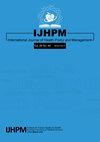Harnessing Country Experiences for Health Benefit Package Design: Evidence-Informed Deliberative Processes and Experiences from the Joint Learning Network; Comment on" Evidence-Informed Deliberative Processes for Health Benefit Package Design – Part II: A Practical Guide"
IF 3.1
3区 医学
Q2 HEALTH CARE SCIENCES & SERVICES
International Journal of Health Policy and Management
Pub Date : 2023-10-04
DOI:10.34172/ijhpm.2023.7856
引用次数: 0
Abstract
Amidst competing priorities for allocating finite health resources, using evidence-informed priority setting is a valuable tool for achieving population-level health goals. The paper by Baltussen, Jansen, and Oortwin (2021) comprehensively reports on the development of practical guidance for evidence-informed deliberative processes (EDPs) which will help with sustainability of programs aimed at universal health coverage (UHC). The authors’ experience with the Joint Learning Network for UHC’s (JLN) peer-to-peer learning platform on evidence-informed priority setting offers insights on the practical challenges faced by countries in HBP design, especially to draw in actors to advocate for the priorities and values across the health system. Lessons harvested from JLN countries that have established such advisory committees can provide practical insights for countries in earlier stages of establishing a systematic process for HBP design. Peer-to-peer learning modalities among countries offer viable and effective approaches to institutionalizing EDPs and systematic priority setting.利用国家经验设计卫生福利包:循证审议过程和来自联合学习网络的经验对“健康福利包设计循证审议程序-第二部分:实用指南”的评论
在分配有限卫生资源的相互竞争的优先事项中,利用循证确定优先事项是实现人口一级卫生目标的宝贵工具。Baltussen、Jansen和Oortwin(2021)的论文全面报告了为循证审议过程(EDPs)制定实用指南的情况,这将有助于实现全民健康覆盖(UHC)计划的可持续性。作者在全民健康覆盖联合学习网络(JLN)关于循证优先事项确定的点对点学习平台上的经验,为各国在全民健康覆盖设计方面面临的实际挑战提供了见解,特别是在吸引行为体倡导整个卫生系统的优先事项和价值观方面。从建立了此类咨询委员会的JLN国家获得的经验可以为处于建立HBP设计系统过程早期阶段的国家提供实际见解。国家间的对等学习模式为将电子教育方案制度化和系统地确定优先事项提供了可行和有效的方法。
本文章由计算机程序翻译,如有差异,请以英文原文为准。
求助全文
约1分钟内获得全文
求助全文
来源期刊

International Journal of Health Policy and Management
Health Professions-Health Information Management
CiteScore
5.40
自引率
14.30%
发文量
142
审稿时长
9 weeks
期刊介绍:
International Journal of Health Policy and Management (IJHPM) is a monthly open access, peer-reviewed journal which serves as an international and interdisciplinary setting for the dissemination of health policy and management research. It brings together individual specialties from different fields, notably health management/policy/economics, epidemiology, social/public policy, and philosophy into a dynamic academic mix.
 求助内容:
求助内容: 应助结果提醒方式:
应助结果提醒方式:


